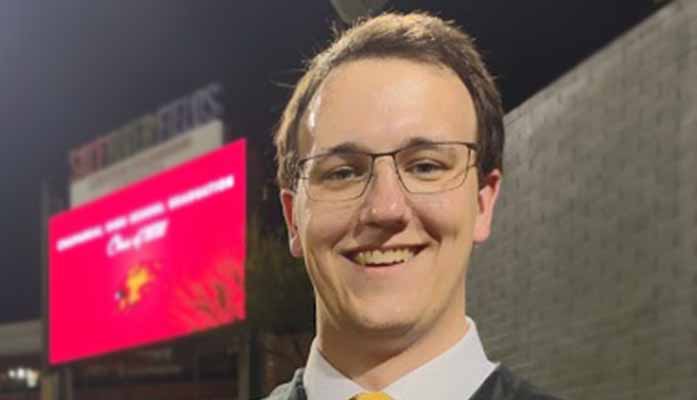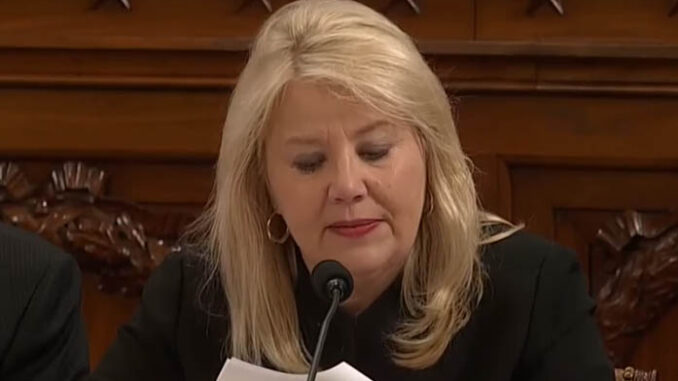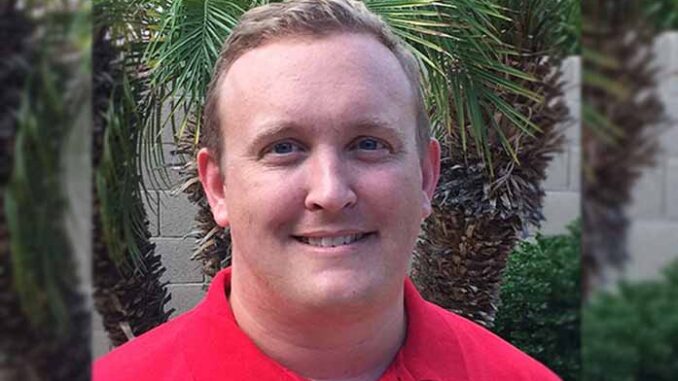
by Corinne Murdock | Aug 31, 2021 | Education, News
By Corrinne Murdock |
After another long week of defending his decision to impose mask mandates for Scottsdale Unified School District (SUSD) students, Governing Board President Jann-Michael Greenburg hung out at a bar maskless last Saturday.
When asked, Greenburg told other reporters via email that confusion over his enjoying a maskless night at the bar while imposing mask mandates at SUSD was nothing more than a “baseless attack.”
“This video is another baseless attack by people whose agenda is to destroy public education and discourage people from serving,” said Greenburg. “It won’t work.”
The CDC cautions that pregnant women are at more of an increased risk for severe illness from COVID-19.
Just a few days earlier, Greenburg cursed at concerned parents during a board meeting. Greenburg later apologized, saying he let his frustration get the better of him.
“Jesus f***ing Christ, people,” muttered Greenburg on the hot mic.
Greenburg hasn’t been the only pro-mask mandate public education leader caught enjoying a maskless social life as of late. Arizona Superintendent Kathy Hoffman attended a baby shower maskless and without adhering to social distancing. None of the other guests wore masks or socially distanced themselves, either.
Corinne Murdock is a reporter for AZ Free News. Follow her latest on Twitter, or email tips to corinne@azfreenews.com.

by Corinne Murdock | Aug 31, 2021 | Education, News
By Corinne Murdock |
Another data breach in two years has Empowerment Scholarship Account (ESA) holders wondering if their information is secure with the Arizona Department of Education (ADE). This past week, it was discovered that the state’s contracted payment platform for ESA funds, ClassWallet, had allowed users to search for other ESA account holders and view their names and email addresses.
In a letter sent to ESA holders, ESA Program Director of Communications and Engagement Sarah Raybon explained that they became aware of the data breach last Friday. Raybon assured ESA holders that ClassWallet would resolve that feature over the weekend.
“Today, our team became aware of an issue in ClassWallet portal’s search feature that allowed account holders to view the names and email addresses of other account holders,” wrote Raybon. “Upon discovery, we immediately contacted the Treasurer’s Office (who holds the ClassWallet contract) and we spoke to ClassWallet directly. We have been advised that ClassWallet engineers will be working over the weekend to get this fixed.”
During the Arizona State Board of Education’s meeting last week, parents questioned why a violation of federal law was happening again. They pleaded with the members to remedy these issues sooner rather than later. One ESA parent, Kelly Pichitino, admonished ADE for not cleaning up their act and ensuring any contract holders follow federal law after last year’s data breach.
“I would like to know why, for a second time, my child’s name is available for a stranger to view along with my personal information?” asked Pichitino. “[I] would think that the department would invest a little more thought and care, time and accountability into their actions.”
Further public commentary at the meeting also focused on other issues with the ESA system, such as inappropriate or incompetent staff behavior, apparently arbitrary denial of funds for educational needs, little to no communication and transparency, and relentless rule or policy changes.
These issues were also detailed in written comments, which are available here.
This isn’t the first time that ADE has compromised ESA members’ information unintentionally. As Arizona Capitol Times discovered and reported last January, the ADE failed to properly redact the personally-identifying information of all ESA account holders when fulfilling a public records request to three requestors, one of which was a group that actively campaigns against ESAs: Save Our Schools Arizona (SOSAZ).
Exposed information included parents’ first and last names, email addresses, the grade of their student(s), and any disabilities if a particular student had special needs.
The Arizona Department of Education (ADE) downplayed the data breach, saying that only “some” personal information was shared inadvertently.
“In the course of fulfilling a public records request to three individuals, the Arizona Department of Education (ADE) inadvertently disclosed some personally identifiable information belonging to Empowerment Scholarship Account holders,” stated ADE. “ADE redacted the document subject to the public records request but failed to secure the integrity of the redaction prior to sending the data, and the document was able to be manipulated to reveal private information.”
Corinne Murdock is a reporter for AZ Free News. Follow her latest on Twitter, or email tips to corinne@azfreenews.com.

by Terri Jo Neff | Aug 30, 2021 | News
By Terri Jo Neff |
Arizona Independent Redistricting Commission (AIRC) will meet Tuesday, Aug. 31 to discuss public comments it heard over the last several weeks as the commissioners prepare to redraw the boundaries of Arizona’s 30 legislative districts and 9 congressional districts as required by law.
The five-member AIRC was formed in January with Democrats Shereen Lerner and Derrick Watchman, Republicans David Mehl and Douglas York, along with Erika Neuberg, an Independent, serving as chairwoman. The commission began its string of 15 hearings last month in an effort to hear citizens’ concerns and suggestions as AIRC prepares to map out Arizona’s 30 redesigned legislative districts (LD) and 9 congressional districts (CD).
The redistricting process requires boundaries to be redrawn under a plan that keeps districts at nearly equal population as required by the U.S. and Arizona Constitutions. It is based on population data garnered by the decennial U.S. Census.
Currently, each LD in Arizona represents about 213,000 people based on a 2010 Census population of nearly 6.4 million, while each CD serves about 710,000 people, give or take a few percent points. The AIRC must now start refresh to draw new boundaries for all the districts based on Arizona’s 2020 Census population of 7,158,923.
In developing those boundaries, the commissioners are required to consider six factors: equal population; compactness and contiguousness; compliance with the U.S. Constitution and the Voting Rights Act; respect for communities of interest; incorporation of geographic features such as city, town and county boundaries; and creation of competitive districts where there is no significant detriment to other goals.
It is the respect for communities of interest and creation of competitive districts which prompted the most public comments during the AIRC’s recent hearings. One of the concerns stems from the decision of the last redistricting commission to split some counties into multiple legislative districts, such as Pinal County which was carved up as part of six LDs.
There are also concerns with the past practice of drawing congressional districts which incorporate disparate and distant communities, as with CD4’s current boundary. That boundary starts in the northwest corner of the state Mohave County, about one hour northeast of Las Vegas. The line then meanders south through Mohave and La Paz counties (minus a few hundred square miles in CD5) down to the northern part of Yuma County.
CD4 also encompasses much of central Arizona, including most of Yavapai County, and it even skirts most of the Maricopa County metropolitan area so it can incorporate parts of Gila and Pinal counties.
Meanwhile, CD1 covers all of four counties (Apache, Graham, Greenlee, and Navajo), most of Coconino County, and parts of Gila, Maricopa, Mohave, Pinal, and Yavapai counties. By comparison, CD2 currently consists of Cochise County in the state’s southeast corner along with eastern Pima County.
At Tuesday’s virtual meeting, the AIRC is also expected to receive updates from mapping consultants and discuss an outreach strategy plan, as well as schedule additional public comment sessions. Among those closely following Arizona’s redistricting efforts is Fair Maps Arizona, founded in 2019 by current Republican gubernatorial candidate Steve Gaynor.
Fair Maps Arizona is providing outreach efforts to help residents better understand legislative and congressional redistricting, and to encourage public comments.
U.S. Rep. Ruben Gallego (D-AZ) is also closely tracking Arizona’s redistricting process. Gallego leads the Congressional Hispanic Caucus, whose political action committee announced earlier this month it plans to spend hundreds of thousands of dollars in three southwestern states, including Arizona.
The PAC is expected to team up with grassroots organization to ensure the concerns of Latinos are taken into consideration by the redistricting committees in Arizona, Colorado, and New Mexico.
“Redistricting will dictate how Latino communities are represented in the halls of Congress for the next decade,” Gallego said at the time of the announcement.

by Corinne Murdock | Aug 29, 2021 | News
By Corinne Murdock |
The Arizona Republic, one of the state’s largest newspapers, misattributed a Democrat’s criticism of President Joe Biden’s Afghanistan handling as part of a narrative that the GOP is primarily critical of the debacle.
It was Representative Tom O’Halleran (D-AZ-01) that offered the criticism in a press release on Thursday. O’Halleran pushed the Biden Administration for more answers and accountability for the increasingly bleak situation in Afghanistan.
“Congress and the American people deserve answers from the administration and associated agencies involved in this evacuation that has now put the lives of so many at risk,” asserted O’Halleran. “These answers must include how and why our brave men and women serving abroad were lost in what now seems was a predicted set of attacks, what the specifics of the Biden Administration’s August 31 deadline agreement with the Taliban are, and what concrete plans are in place now to ensure we can safely evacuate our service members, all Americans, all allies, and their families. We also must quickly understand what risks we face as a nation.”
However, the Republic attributed the quote to a Republican – Representative Debbie Lesko (R-AZ-08). They characterized her version of the quote as continued criticisms coming from the Republican Party.
“As Americans faced the deadliest day for U.S. troops in a decade, Rep. Debbie Lesko, R-Ariz., continued the GOP criticism of Biden’s evacuation efforts,” read the article.
Lesko tweeted about the misattribution later that day.
“The AZRepublic is so focused on criticizing Republicans, they accidentally criticized a Democrat,” wrote Lesko. “The quote they attributed to me below was actually from DEMOCRAT Tom O’Halleran. Criticism for Biden handling of Afghanistan is bipartisan—even if the press doesn’t want you to know!”
At some point after Lesko’s post, the Republic corrected the article to include a quote from Lesko. However, the Republic kept the original language attributing Lesko’s remarks as part of continued GOP criticism. They cast O’Halleran’s comment as Democrats merely “express[ing] concern” over Biden’s withdrawal plans.
The Republic also added a brief note about the correction to the top of their article, but didn’t apologize for the mistake or note that they regretted the error.
“Corrections & Clarifications: A statement from U.S. Rep. Tom O’Halleran was attributed to another member of Congress in an earlier version of the article,” read the note of correction.
AZ Free News inquired with the author of the piece, Ronald Hansen, about the misattribution. Specifically, if he’d reached out to Lesko and if he believed this misattribution substantially changed the impact of the article. Hansen didn’t respond by press time.
Corinne Murdock is a reporter for AZ Free News. Follow her latest on Twitter, or email tips to corinne@azfreenews.com.

by Terri Jo Neff | Aug 29, 2021 | News
By Terri Jo Neff |
Last week’s announcement by Gov. Doug Ducey that all state buildings are to lower their flags to half-staff through Aug. 30 in honor of U.S. service members recently killed in Afghanistan has drawn renewed attention to President Joe Biden’s connection to Afghanistan and the Arizona National Guard.
In February 2008, then-Senator Joe Biden, along with Senator John Kerry and Chuck Hagel, were touring Afghanistan when their helicopters made an emergency landing in a mountainous area during a blizzard.
A rescue team with soldiers from the Arizona National Guard’s 1st Battalion, 158th Infantry Regiment “Bushmasters” was sent out to make the treacherous trek from Bagram Airfield to the landing site, according to a news article later posted on the National Guard’s website.
The article noted that the rescue mission was conducted by Combined Joint Task Force-82 which consisted of a 1/158th platoon and other servicemembers. The soldiers were not initially aware of the identity of the VIPs on the helicopters, Maj. John Bozicevic wrote.
Despite the intense weather, limited visibility, and hazardous route, the rescue team found the helicopters and convoyed the senators back to base. Other soldiers remained with the helicopters and crews for more than 15 hours in stormy weather.
Public records show the Arizona National Guard’s 1st Battalion, 158th Infantry arrived in Afghanistan in April 2007 and returned to Arizona the month after the 2008 rescue of the senators. The unit suffered two casualty while deployed.
Ten years later, the 1/158th was deployed back to Afghanistan as part of Operation Freedom’s Sentinel. The Bushmasters returned home in May 2019. Several other Arizona National Guard units have been deployed to Afghanistan over the last 20 years.
Kerry later became U.S. Secretary of State under President Barack Obama from 2013 to 2017, while Hagel served as U.S. Secretary of Defense from 2013 to 2015. Biden became Obama’s vice president and was sworn in as President in January, after which he has become a frequent target of Ducey’s.
The governor’s order to lower flags to half-staff called out the Biden White House for how the drawdown of U.S. troops in Afghanistan has been handled.
“As we mourn the dead, we must also recognize the context for this terrible attack,” Ducey noted. “American troops have fought, bled and died in Afghanistan for two decades to keep this country from once again becoming a safe haven for terrorists. We are now seeing in real time how the recent action to withdraw from Afghanistan has made America and the world less safe.”
Ducey also expressed his displeasure with the Biden Administration earlier this month when he announced the extension of the Arizona National Guard’s southern border security support mission through September 2022 with $25 million in state funding. He noted that law enforcement officials are overwhelmed, and the situation is out of control.
“It’s clear that this White House has neither the ability nor the desire to address the border disaster — a crisis of their own making,” Ducey said. “This situation is the direct result of reckless policies and failed communication by President Joe Biden and Vice President Kamala Harris.”
More than 150 Arizona National Guardsmen are serving along with local and state law enforcement agencies in border communities. Guardsmen are assisting those agencies with medical services in detention facilities, data analysis, camera maintenance and surveillance, and logistical and administrative support, according to Ducey.
“The brave men and women of the Arizona National Guard are standing in the gaps,” Ducey said. “Their mission directly contributes to the success of law enforcement officers working to maintain law and order on Arizona’s southern border. I’m grateful to all those who serve our state and are working day and night to keep Arizonans safe.”
In April, Ducey declared a state of emergency regarding Arizona’s shared southern border with Mexico and deployed the Arizona National Guard with $2.5 million in funding for the mission. Then in June, the governor signed state budget legislation which included $25 million in additional funding for the Arizona National Guard’s border mission.
The budget also provided $30 million to law enforcement agencies to assist with their border security operations along with funds for the state’s Border Strike Force.
Data released by the U.S. Department of Homeland Security shows there were more than 212,000 official encounters with illegal immigrants along the country’s southern border in July. That was up from 188,829 in June and represents a 21-year record high.
DHS records also show that illegal immigrant encounters have gone up every month since President Biden took office in January.

by Corinne Murdock | Aug 28, 2021 | News
By Corinne Murdock |
Amid the turmoil of the Biden Administration’s Afghanistan Crisis, civilians are stepping up to save the lives of American citizens and Afghans who assisted our country throughout the war. State Representative Steve Kaiser (R-Phoenix) is one of those civilians.
AZ Free News reached out to Kaiser after obtaining his press release asserting that President Joe Biden and Vice President Kamala Harris bore the blame for the Taliban’s takeover. In that statement, Kaiser mentioned Afghan nationals he’d befriended who were still in Afghanistan. We reached out to Kaiser to elaborate; it was then the representative revealed that he and others have been busy with extraction efforts for those Afghans who served alongside American soldiers.
Kaiser explained that this effort began when he received a message from one of the Afghan nationals he’d befriended, following the Taliban takeover.
“We have two interpreters that we worked over there that were still over there when all this started. I was Facebook friends for a lot of years with one of them. He was always in Kabul – he’s got kids now and is married,” explained Kaiser. “When all this fell apart, all of a sudden he was emailing me[.]”
At that point, Kaiser and fellow service members reached out to Congressman David Schweikert (R-AZ-06) and some active duty members for help. In the meantime, the coalition got to work pulling together the special immigrant visa paperwork necessary.
“I’m definitely just working as a civilian through a congressman. That’s my only lever right now,” said Kaiser. “We’re lucky that some of us that were in the unit together have stayed in the military.”
As of this publication, the Afghan national and his family have made it safely to the U.S.
However, their coalition’s work isn’t done. This week, another Afghan ally reached out to Kaiser.
“I got a phone call and I saw on the phone the caller ID that it’s from Afghanistan. I normally wouldn’t answer in the middle of a meeting, but I did,” explained Kaiser. “[It was] another interpreter stuck in Kabul with his family. You could hear the fear in his voice[.]”
Kaiser explained that these people they’re saving aren’t just attempting to get to America – they’re those who fought alongside American soldiers, making the difficult decision to leave their homeland for the safety of themselves and their families. He emphasized that this is the purpose of asylum.
“These are people that are friends and stood next to us in a warzone and are hunted actively for standing with us,” explained Kaiser. “There are people being disparaging about this – calling them the ‘unwashed masses.’ I can tell you – there’s ten Afghans coming to Arizona. Five of them are from two different families and four are individual males. They all had special immigrant visa paperwork – there’s a lot that goes into [that paperwork]. These are people who have special immigrant visas, who are already people who worked alongside us [in the military]. These are people that stood next to us, faced death and dismemberment and are now being hunted. They deserve the same respect as our service members.”
Kaiser explained further that the Afghan nationals, such as the interpreter currently needing help, were the ones who ensured the safety of American soldiers.
“These interpreters kept us safe. They didn’t just translate for us. They were cultural advisors, they were local nationals from Kabul [who] grew up in Afghanistan,” said Kaiser. “They filled in a lot of cultural gaps that we didn’t get because our training was pretty poor going over there.”
This wasn’t Kaiser’s first time assisting Afghan nationals. Kaiser mentioned that he’d assisted in extracting another friend years ago – one who’d lost both legs and an arm serving alongside American soldiers. That friend is now happily married with several daughters.
Kaiser understands that the issue is controversial, but these aren’t just any Afghans. They’re the people who were willing to sacrifice for the American cause.
“I’m a conservative, and I know people say that loosely and easily. I understand it’s going to be controversial – I understand where they are coming from,” said Kaiser. “If I lose an election saying this, so be it – this is more important than that. This is life and death, you know?”
Corinne Murdock is a reporter for AZ Free News. Follow her latest on Twitter, or email tips to corinne@azfreenews.com.






